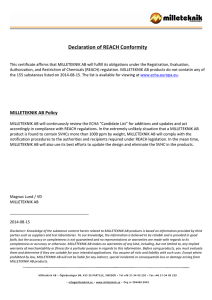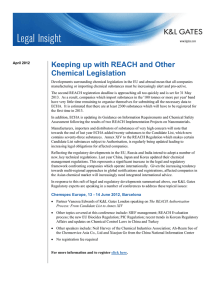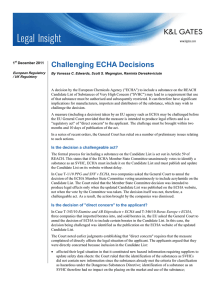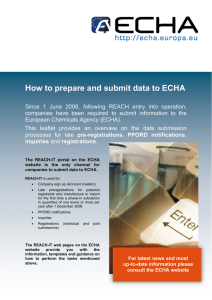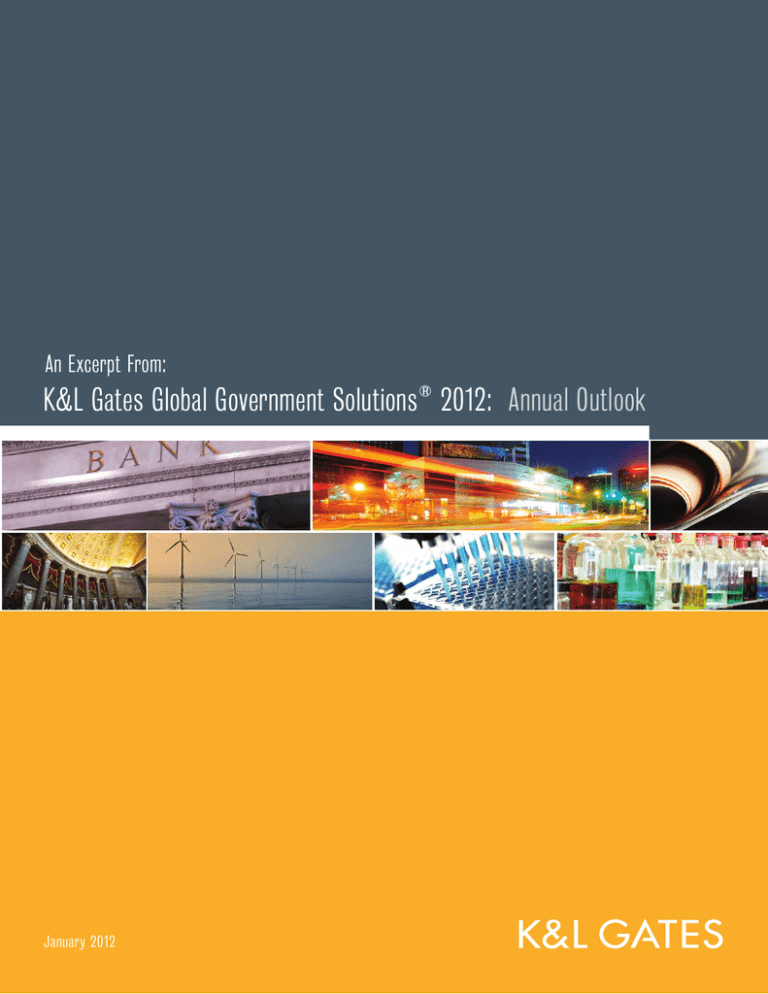
An Excerpt From:
K&L Gates Global Government Solutions ® 2012: Annual Outlook
January 2012
Energy and Environment
Resolution of Chemical Industry Disputes under the EU’s “REACH” Regime
European Union (EU) companies manufacturing or importing one ton or more of
certain chemical substances must register these activities with the newly established
European Chemicals Agency (ECHA). The new system, which is set out in
Regulation (EC) No 1907/2006, known as REACH (Registration, Evaluation,
Authorization, and Restriction of Chemicals), requires the industry to collect and
share the data on substances in order to register them with ECHA. The ECHA is to
evaluate this data and is authorized to impose stringent regulation of dangerous
substances or ban them altogether. Under REACH, the term “chemical substances” is
broadly defined to include not only a wide range of substances, but also products
such as paints and cosmetics that contain them.
Unlike other EU regulatory legislation,
REACH foresees a variety of mechanisms
for resolving disputes arising out of this
framework. REACH provides for the right
to challenge certain decisions of ECHA
and the European Commission before the
EU General Court, a lower, independent
court attached to the EU Court of Justice
(ECJ). REACH also provides for the
appeal of other ECHA decisions to the
Board of Appeal—a dispute resolution
body which is part of ECHA. REACH also
recognizes a contractual right to arbitrate
certain disputes and acknowledges that
certain rights conferred by REACH may
be pursued before national courts.
Increasingly, ECHA’s and the
commission’s decisions with regard
to REACH obligations are being
challenged, either in court or before the
Board of Appeal. To date, very few of
these challenges have been successful;
however, and companies considering
such a challenge need to carefully
consider how, where, and when it is most
appropriate to do so.
ECHA’s Board of Appeal
The ECHA Board of Appeal is set up
within the agency to guarantee the
processing of appeals for persons
affected by certain decisions taken by
ECHA. The Board of Appeal—whose
members are required by REACH to
be independent—is responsible for
deciding on appeals relating to, among
other matters, rejections of registrations,
decisions on sharing data in the case
of substances, examinations of testing
proposals, and evaluations of registration
dossiers. To have standing to pursue
an appeal, the decision at issue must
be addressed to, or be of direct and
individual concern to, the appellant.
Appeals will be decided (by majority
48
K&L Gates Global Government Solutions ® 2012 Annual Outlook
Energy and Environment
vote) by three members of the Board of
Appeal; this procedure is similar to that for
appeals to the EU General Court or ECJ.
To date, eight appeals have been lodged
with the Board of Appeal, and of these,
seven have led to a published decision.
Of those seven appeals, two were
withdrawn and one has been satisfied.
REACH provides that ECHA’s Executive
Director may rectify the contested
decision within 30 days of the appeal
being filed. On that basis, three appeals
were discontinued after ECHA rectified
the decision in question.
Actions before the General Court
Under REACH, decisions of the Board
of Appeal may be brought before the
General Court. The General Court may
also hear challenges to decisions of the
ECHA as to which there is no right of
appeal to the board, and with regard
to European Commission decisions on
REACH obligations. In cases where
ECHA has an obligation to take a
decision but fails to do so, the party
concerned may bring proceedings for
failure to act before the General Court.
A number of challenges against ECHA
and commission decisions concerning
the early stages of the authorization
process have already been brought
before the General Court. Several of
these have recently been held to be
inadmissible on the grounds that (i) the
decision was not of “direct concern”
to the applicant; (ii) the decision
challenged did not produce legal effects
and thus was not a challengeable act;
or (iii) the challenge was out of time.
Moreover, the European Court of Justice
has already given its first two judgments
on questions of interpretation of REACH
that had been referred by the UK High
Court. In addition, a number of appeals
have been logged against General
Court decisions.
The Role of National Courts
National courts also have a role under
REACH. Specifically, in the event of data
sharing between companies—either
for existing data or for new data being
developed via testing—REACH provides
that one party is entitled to have a claim
on the other party for an equal share of
the cost incurred, or to prohibit the other
party from manufacturing, importing,
or selling the substance, provided that
certain conditions are satisfied. In both
cases, REACH provides that the entitled
party may bring a claim before the
national courts. More generally, where a
question on the interpretation of REACH
arises in proceedings before a national
court, that court may—and in certain
circumstances must—refer the question to
the ECJ for judgment.
The Future
To date, the REACH dispute resolution
regime remains barely tested for most
parties subject to REACH. However,
given the scope of REACH and its
applicability and potentially significant
impact on industry, there is likely to be a
significant escalation of REACH-related
disputes in the near future. There have
been recent reports of concerns in the
General Court, in particular over the likely
number of technically complex REACHrelated appeals that the court will be
called upon to deal with in the next few
years and beyond. Companies subject
to REACH should therefore be vigilant
in producing the best argument before
ECHA’s Board of Appeal or the General
Court and ensuring that proceedings are
lodged in a timely fashion.
Vanessa C. Edwards (London)
vanessa.edwards@klgates.com
Raminta Dereskeviciute (London)
raminta.dereskeviciute@klgates.com
Arbitration under REACH
Last, but not least, REACH recognizes
circumstances whereby parties in
disagreement may choose to arbitrate.
Specifically, when companies or
individuals cannot agree on sharing
certain information where this is
mandatory under REACH, or cannot
agree on cost sharing for tests to develop
data, they can submit the matter to an
arbitration tribunal whose decision the
parties agree to accept.
K&L Gates Global Government Solutions ® 2012 Annual Outlook
49
Anchorage Austin Beijing Berlin Boston Brussels Charleston Charlotte Chicago Dallas Doha Dubai Fort Worth Frankfurt Harrisburg
Hong Kong London Los Angeles Miami Moscow Newark New York Orange County Palo Alto Paris Pittsburgh Portland Raleigh
Research Triangle Park San Diego San Francisco São Paulo Seattle Shanghai Singapore Spokane Taipei Tokyo Warsaw Washington, D.C.
K&L Gates includes lawyers practicing out of 40 offices located in North America, Europe, Asia, South America,
and the Middle East, and represents numerous GLOBAL 500, FORTUNE 100, and FTSE 100 corporations, in
addition to growth and middle market companies, entrepreneurs, capital market participants and public sector
entities. For more information about K&L Gates or its locations and registrations, visit www.klgates.com.
This publication is for informational purposes and does not contain or convey legal advice. The information herein should not be used or relied upon in regard to
any particular facts or circumstances without first consulting a lawyer.
©2012 K&L Gates LLP. All Rights Reserved.

